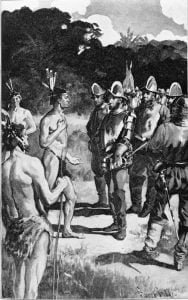Taensa Indians
Taensa Tribe: Meaning unknown, but the name is evidently derived from that of one of the tribe’s constituent towns. Taensa Connections. They were one of the three known tribes of the Natchez division of the Muskhogean stock. Taensa Location. At the western end of Lake St. Joseph, in Tensas Parish. (See also Alabama.) Taensa Villages The only list of Taensa villages preserved was obtained by Iberville through the medium of the Mobilian trade language and it is uncertain how much of each name is a Mobilian translation. In four of them we recognize the Mobilian word for people, okla. These … Read more

